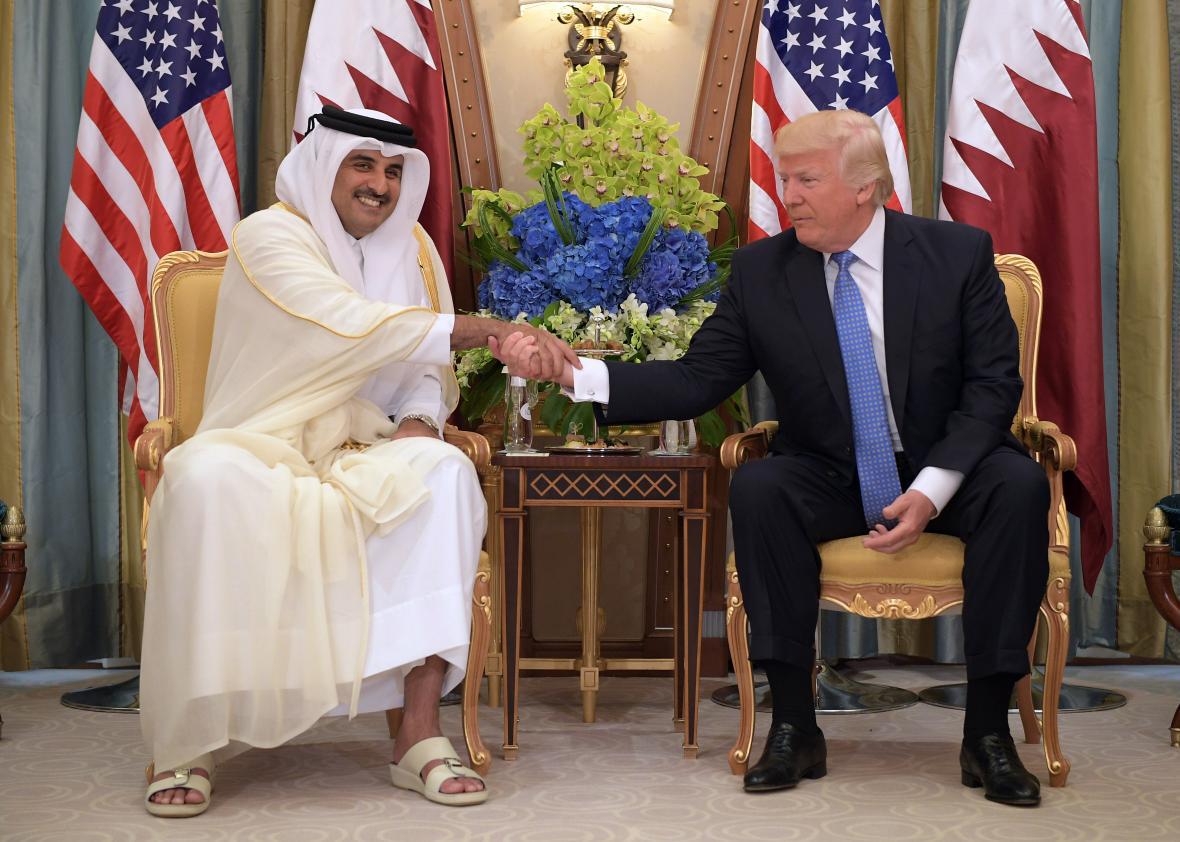You would think that President Trump by now would be something of a connoisseur of fake news, able to quickly suss out the provenance, quality, and underlying intention of whatever piece of agit-prop, disinfo, or nonsense comes over the transom. And yet, it appears the president may have been suckered by his new friends in the Middle East.
The Washington Post reported Sunday that U.S. officials believe the United Arab Emirates orchestrated the hacking of Qatari news sites in May, posting false quotes by the country’s leader that set off the Gulf region’s most serious diplomatic crisis in years. The UAE has denied involvement.
The hack allegedly hit Qatar’s official news agency website along with its Instagram and Twitter accounts, which posted stories in which the country’s Emir, Sheikh Tamim bin Hamad al-Thani, praised Iran as a force for stability, described Qatar’s relations with Israel as good, and said there were tensions between his government and Trump. The UAE and Saudi Arabia responded by blocking Qatari news sites—including Qatar-owned al-Jazeera. A couple weeks later, those countries, along with Egypt and Bahrain, imposed a blockade on Qatar, issuing it a list of demands, including cutting its ties with Iran and Hezbollah, closing down a Turkish military base on its territory, and shuttering al-Jazeera. The showdown is ongoing.
Even if al-Thani’s comments had been real, they were obviously just a pretext for actions that the region’s governments had wanted to take against Qatar for a while. Qatar, the 2022 World Cup host, is one of six members of the Gulf Cooperation Council along with Saudi Arabia and the UAE, and is also a participant in the coalition fighting ISIS and in the Saudi-led coalition in Yemen. However, it’s long pursued a much more independent and controversial foreign policy, supporting the Muslim Brotherhood in several countries as well as jihadist groups in Syria, hosting leaders of groups like the Taliban and Hamas, and maintaining relations with Saudi Arabia’s arch-enemy Iran. Other authoritarian Arab governments were particularly incensed by al-Jazeera’s favorable coverage of the Arab Spring uprisings and the Qatari government’s support for Egypt’s short-lived Muslim Brotherhood government. The Saudis, in particular, have wanted to bring Qatar in line for quite some time.
So, why now? It may have had something to do with Trump’s visit to Saudi Arabia in May, in which he praised Saudi leaders for fighting terrorism, urged a crackdown against terrorist financing, and gave a strongly anti-Iran speech in the capital of Iran’s arch-enemy.
While much of what Qatar’s critics charge is true, you also have to consider the source. Saudi Arabia doesn’t exactly have its hands clean when it comes to funding extremism around the world either. But the Trump administration shares most Arab governments’ fixations with Iran and the Muslim Brotherhood, so after Trump’s visit, they likely assumed their offensive against Qatar would be well-received. Trump played his role perfectly, giving himself credit for all these events by tweeting, “During my recent trip to the Middle East I stated that there can no longer be funding of Radical Ideology. Leaders pointed to Qatar - look!”
But one complicating factor is that U.S. foreign policy currently operates on several tracks, some of them entirely independent of the White House. While Trump was quick to side with Qatar’s rivals, Secretary of State Rex Tillerson and Secretary of Defense James Mattis took a neutral tone. After all, despite Qatar’s sins, it also hosts the largest U.S. military base in the Middle East. Despite the tensions, the U.S. and Qatar are moving forward on a $12 billion arms deal. Tillerson also spent last week engaged in a round of shuttle diplomacy in the Gulf, culminating in an agreement to fight terrorist financing. This didn’t satisfy Qatar’s rivals, and regional governments are now understandably confused about the U.S. position. The divide may only deepen now that U.S. intelligence officials have accused the UAE of orchestrating the hack that sparked the crisis. Given how Trump has responded in the past to intelligence agency statements that have undermined his own public utterances, it will be interesting to see how the White House responds to this latest news.
Ironically, the blockade has deepened the cooperation with Qatar from Turkey and Iran—both of which have stepped in amid the blockade with food shipments and other support.
The crisis may, as some analysts are suggesting, be evidence of an emerging form of soft warfare, involving cyberattacks, disinformation, trade policy, PR, and lobbying campaigns as tools of state power. But given that U.S. support has not been as forthright as expected and Qatar is still holding out, it’s not clear yet whether the Saudi-led bloc’s use of these tools has been effective.
